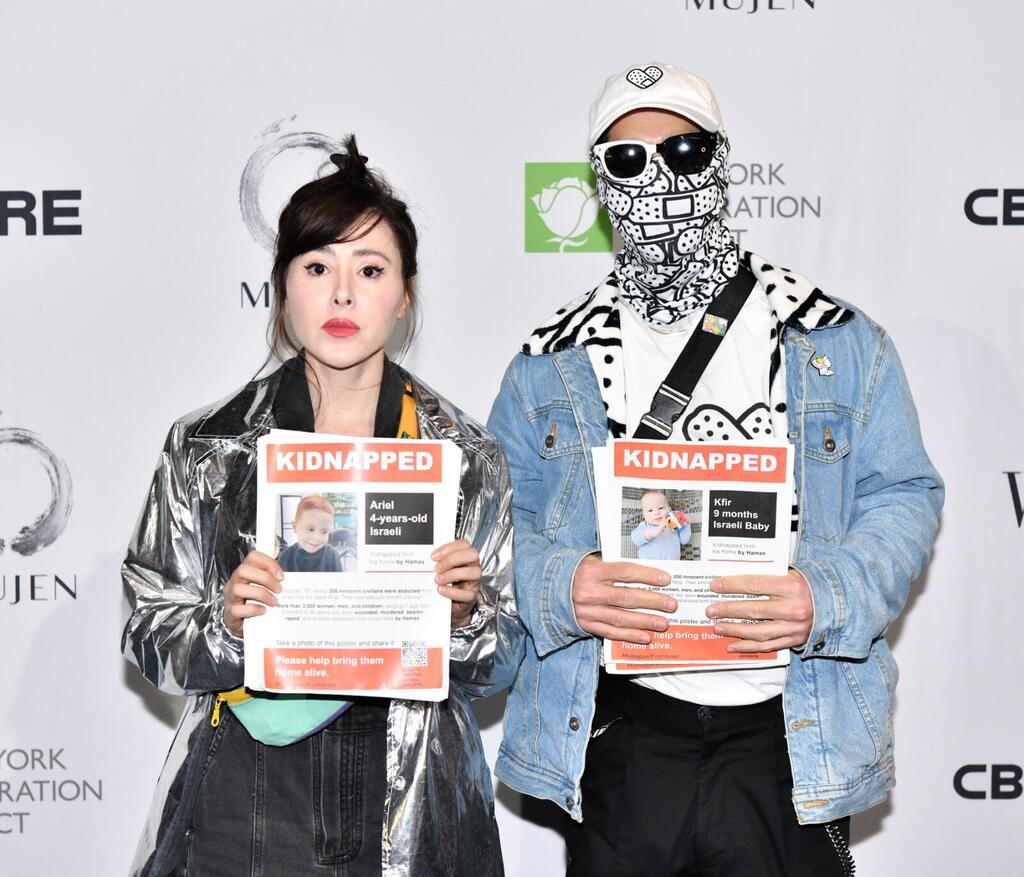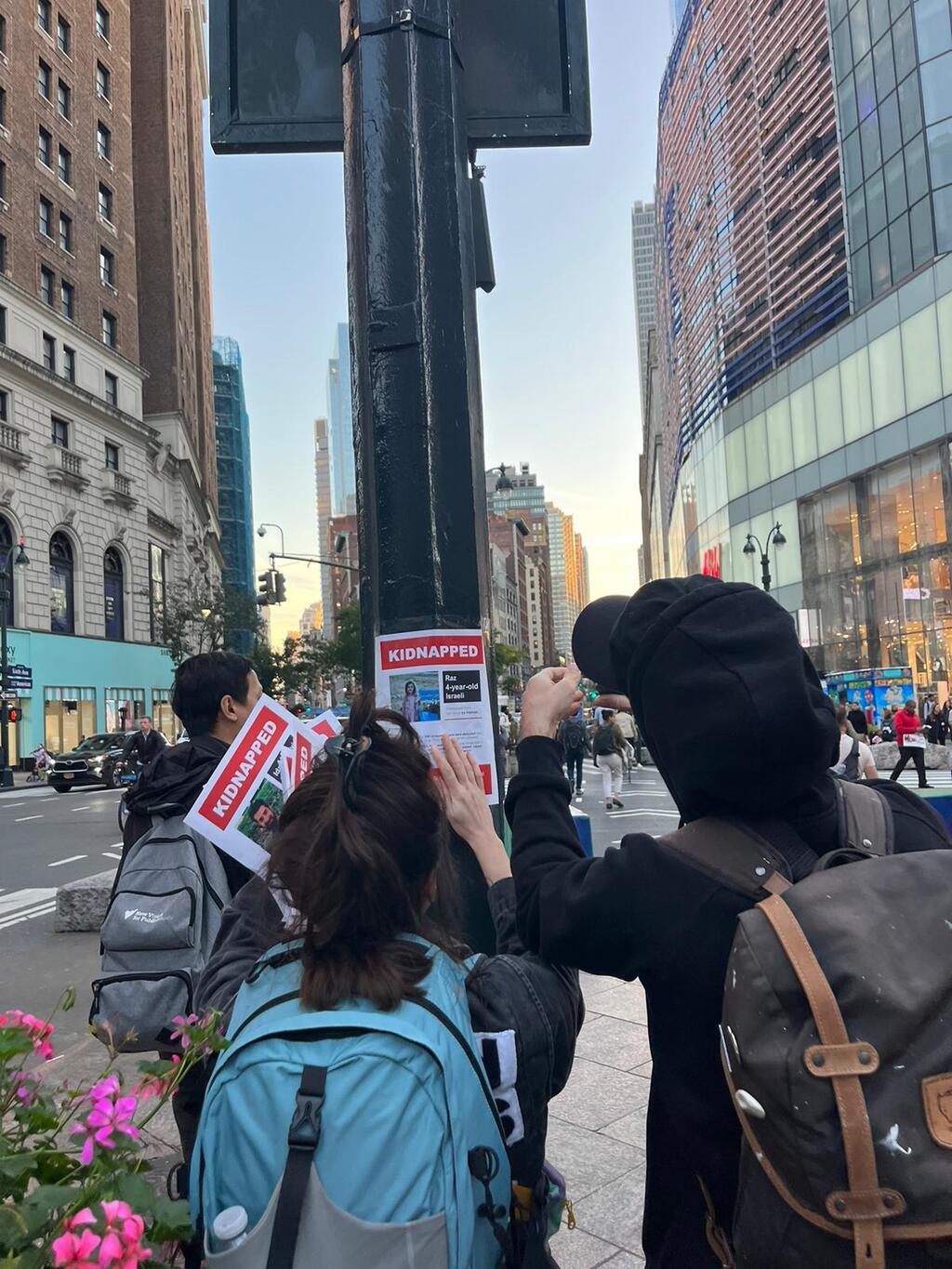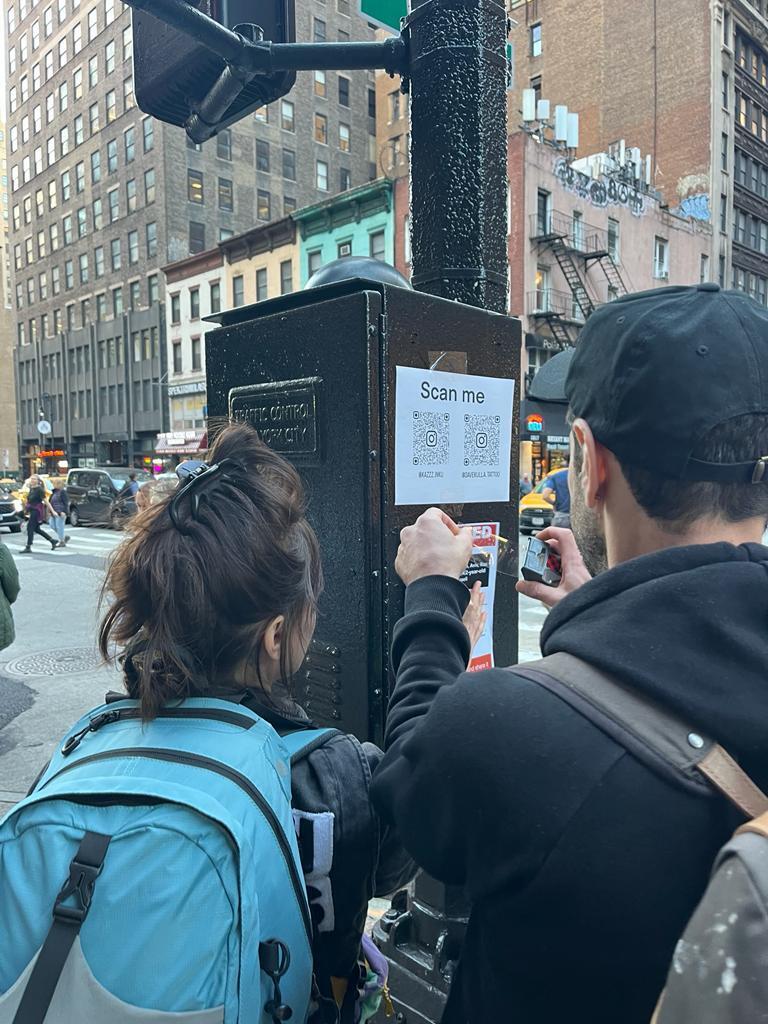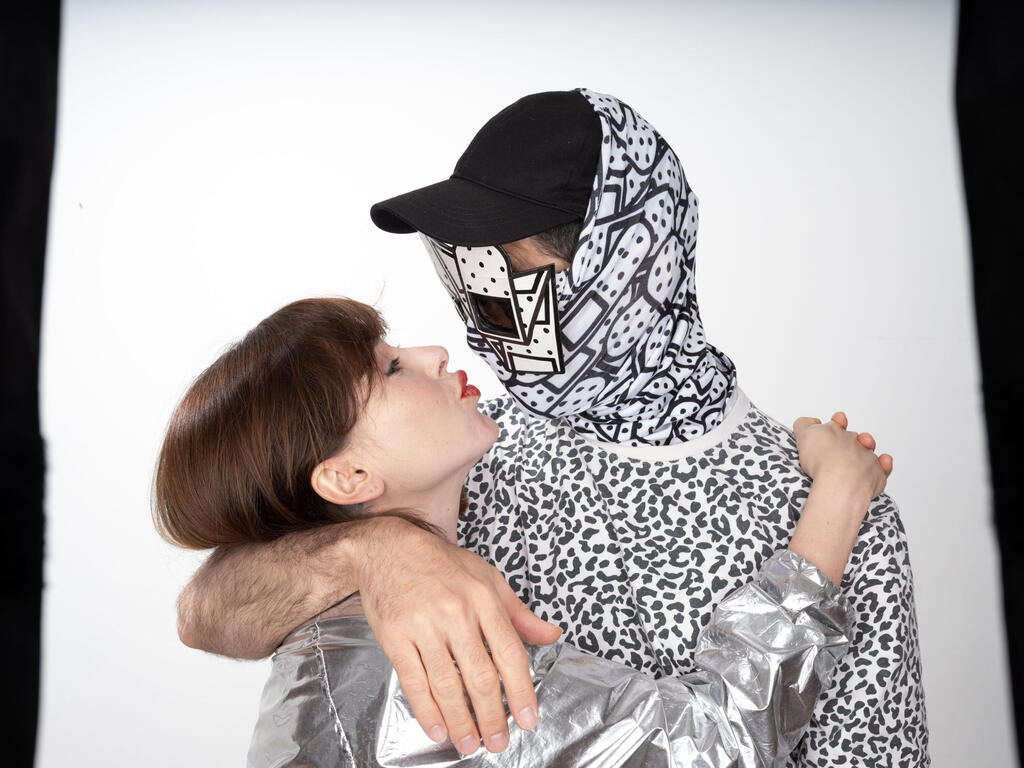The Israeli couple, street artists Dede Bandaid and Nitzan Mintz, who together with Tal Huber initiated the viral campaign featuring the faces of the Israeli hostages, are shocked by the young people who tear down the posters and believe that this is a clear expression of antisemitism. And - how did their magical love story begin, and why did it require Nitzan a persistent courtship of four years
More stories:
"The more the media shows pictures from Gaza, the more it becomes trendy to criticize Israel. The posters of the hostages have turned into the real event, and that's when the trend of tearing down the posters began. It even became trendy to take pictures of yourself tearing down posters and uploading them on social media, or to take pictures of posters and change their titles", says sadly Dede Bandaid, an Israeli street artist, who initiated together with his partner, Nitzan Mintz, and with Tal Huber, a designer and owner of the branding company Giraff, a campaign to raise awareness of the Israeli hostages, by creating posters with the names and pictures of the hostages, so everyone, everywhere In the world, can print and hang.
"It's just absurd," says Nitzan. "People who tear down posters are not at all interested in the fact that the pictures displayed on the posters are real, that there are people who are now sitting at home waiting for their children to return from Hamas captivity. Dede and I have often said that if this was a campaign of dogs or cats that got lost, no one would dare to tear down their pictures; But Jews? No problem. They rip down even pictures of babies and elderly without thinking twice."
"In my opinion, this act of tearing down the posters shows that there is still antisemitism. We heard from our grandparents, who were born in either European or Arab countries, about how much they were abused and the level of antisemitism they experienced, but we, as young people, did not believe them, that this was the nature of the world. We thought that today the world smiles upon us and that everything is fine."
"Dede and I have often said that if this was a campaign of dogs or cats that got lost, no one would dare to tear down their pictures; But Jews? No problem. They rip down even pictures of babies and elderly without thinking twice"
Dede: "There are so many people who don't stop to think about what exactly happened. They simply recognize a 'white' person who is supposedly stronger, and immediately assault."
'This campaign belongs now to hundreds of thousands of people'
Dede and Nitsan, who currently live in New York, woke up on that Black Saturday of October 7, and felt very helpless. "Being in New York, disconnected, when your heart is in Israel, and not understanding what exactly happened, makes you feel tremendously helpless," Dede says. "On the first phone conversation with the family from Israel, we were told that the bombings were more than usual," says Nitzan. "We didn't take it seriously and neither did they, but the second conversation sounded completely different. They told us - 'Nitzan and Dede, don't you dare return to Israel, our country is being destroyed'."
Wow.
Dede: "It was clear to us that we had to help at least a little bit. We weren't called up to military reserves so we felt that we could shout from here the cry of the country, that the world must know."
Nitzan: "We are not political artists, this is not usually the center of our activity, but we could not stand still doing nothing while our home, families, friends and land are under threat of being eliminated."
So they came up with the idea of helping through what they know to do best: street art. They partnered with Tal Huber, who is located in Israel, and the three began working on creating a public database that can be downloaded, featuring posters of the hostages, which is constantly updated.
"It took us 24 hours to come up with the campaign," says Nitzan. "It's not a long time, but for us, it felt like an eternity. We reflect in our feelings all Israelis and many Jews around the world. People felt frustration, anger and helplessness as they didn't know how they could help."
Dede and Nitzan printed about two thousand first copies of the posters and went out to the streets of Manhattan to hang them. "We crossed most of the city on foot carrying a heavy box, and we also bought sets of masking tape to distribute to people," describes Nitzan.
"We didn't think we would be the only ones to put up the posters. We were sure that if we approached strangers, everyone would take some posters and hang them in their neighborhood. That was the goal, but no one joined us. It was shocking."
"It was discouraging and heartbreaking," Dede says. "We crossed streets and neighborhoods in Manhattan and pasted as many as we could on poles and subway stations, but everyone we showed the poster to on the way didn't even want to take a look. People were not interested and didn't seem to care."
Nitzan: "There were many disparaging comments, it was terrible. There is no limit to human obtuseness. We hung all the first two thousand copies by ourselves. We returned to the apartment physically and mentally exhausted and talked to Tal, telling her what happened; then the three of us decided to upload the files through our social networks as a kind of appeal to the general public, asking them to print and distribute the posters."
Their request has been answered. The next morning, they discovered that the poster had gone viral overnight. The file they designed was circulated among groups on Facebook and WhatsApp, at first by Israelis in New York and later all over the world. A day later, they already started receiving pictures of the posters hanging in cities in Europe, South America, the Far East and Australia.
"The goal of the campaign is to raise awareness about the hostages or otherwise no one abroad would know this was happening," says Dede. "Communities of Israelis and Jews from all over the world joined the endeavor in a minute. They circulated it in groups, associated with each other through WhatsApp groups, got organized in groups, printing and hanging the posters."
Nitzan: "At the same time, our own group with Tal Huber continued to grow. We became a serious headquarters that works around the clock, on a voluntary basis. Now we are just one group out of hundreds located in every city in the world. There are now headquarters that run independently and withdraw information and details from our updated website. Each of us has countless tasks and is responsible for other volunteers in the world.
Everything is done very organically, and out of this organization more creative ideas arise, such as the Tables of Shabbat exhibit, portraying the posters of the kidnapped. Everyone has permission to take the files and do whatever they want with them. This campaign belongs now to hundreds of thousands of people."
Dede: "We were asked to make billboards in Times Square, huge projections on buildings and digital trucks. People raise funds, get equipment and just go for it."
What do you think about JewsOfNY pages that spread the names and faces of those who rip down the posters?
Nitzan: "This is very important, and it encourages us a lot."
Dede: "We have already heard about employers or school staff who asked to fire or expel people who tore down posters."
"The goal of the campaign was not to expose antisemitism, it is a by-product that happened unintentionally, but we see great value in it. We cannot continue living in an illusion, we must understand what forces we are facing, so we can defend and take care of ourselves"
Nitzan: "It is mainly important for us to continue raising awareness of the hostages. The goal of the campaign was not to expose antisemitism, it is a by-product that happened unintentionally, but we see great value in it. We cannot continue living in an illusion, we must understand what forces we are facing, so we can defend and take care of ourselves."
The poster campaign has already reached the UN and the parliaments of many countries. "The representatives of the UN bring the posters with them and use them for hasbara." Nitzan says. "Members of the French and Czech parliament took pictures with the posters, as well as the president of Germany and the U.S. Congress. It rolls like a giant snowball and that's what makes the campaign work."
Are you in touch with the families of the hostages?
Dede: "The families contact us all the time at their own pace. They thank us for keeping in mind the memory and face of their loved ones."
Nitzan: "All the pictures stored in our database came from the families of the hostages. Today there are about 240 hostages, and we have 220 photos in the database, because we work only with photos that the families have approved. We usually wait for them to contact us. We don't want to hassle or bother them".
Has the State of Israel contacted you, offering help, budget or participation in the amazing Hasbara that you do completely voluntarily?
Nitzan: "How can we expect anything from our government now? I don't expect to hear from them at all, and I just need to make sure that they don't bother us or put a spoke in our wheel. I've lost faith in this government to the extent that I wouldn't expect any of them to bother and help with the campaign. The country is run entirely by volunteers. I don't really understand what the people who receive salaries do. "
'I tried to meet him for four years'
Nitzan and Dede have been a couple and share their artwork for almost 11 years and declare that they have been inseparable since the day they met. "Do you want to tell our romantic story or shall I?" Nitzan asks and smiles. "Our romantic side will tell," Dede smiles back.
"I started creating my own street art while writing my poems near his works already on the street. I 'poked' him to get his attention. I did that for two years and but to no avail. Then I started writing to him on Facebook, and we became pen pals. It took two more years of correspondence before he agreed to meet me. I tried to meet him for four years"
"We are both graffiti and street artists even before we met. We grew up in Tel Aviv and created pieces in the streets of the city for years," Nitzan recalls. "Dede started his work in the public sphere two or three years before me. I admit that I was a big fan of him. I really liked his works, and he really impressed me.
"Dede is anonymous, no one knows who he is or what he looks like, and I was a curious and stubborn girl. I tried to reach him but I couldn't because he was inaccessible, and it was hard to understand who he was. So, I started creating my own street art while writing my poems near his works already on the street. I 'poked' him to get his attention. I did that for two years and but to no avail. Then I started writing to him on Facebook, and we became pen pals. It took two more years of correspondence before he agreed to meet me. I tried to meet him for four years."
Charming.
Dede: "After a week of dating we moved in together, shared a studio and did everything together. Since then, we have been inseparable. We spend a lot of our shared time at the studio, or we wander around the city looking for new locations to create. On one of our first dates, we went for a walk looking for a graffiti location."
Nitzan: "The four-year courtship really paid off for me, I'm glad I insisted. We are not married and probably won't get married either because it doesn't really interest us, but we are married in every possible way. Our main goal is to be together 24/7, and not to be separated for even one single night."
5 View gallery
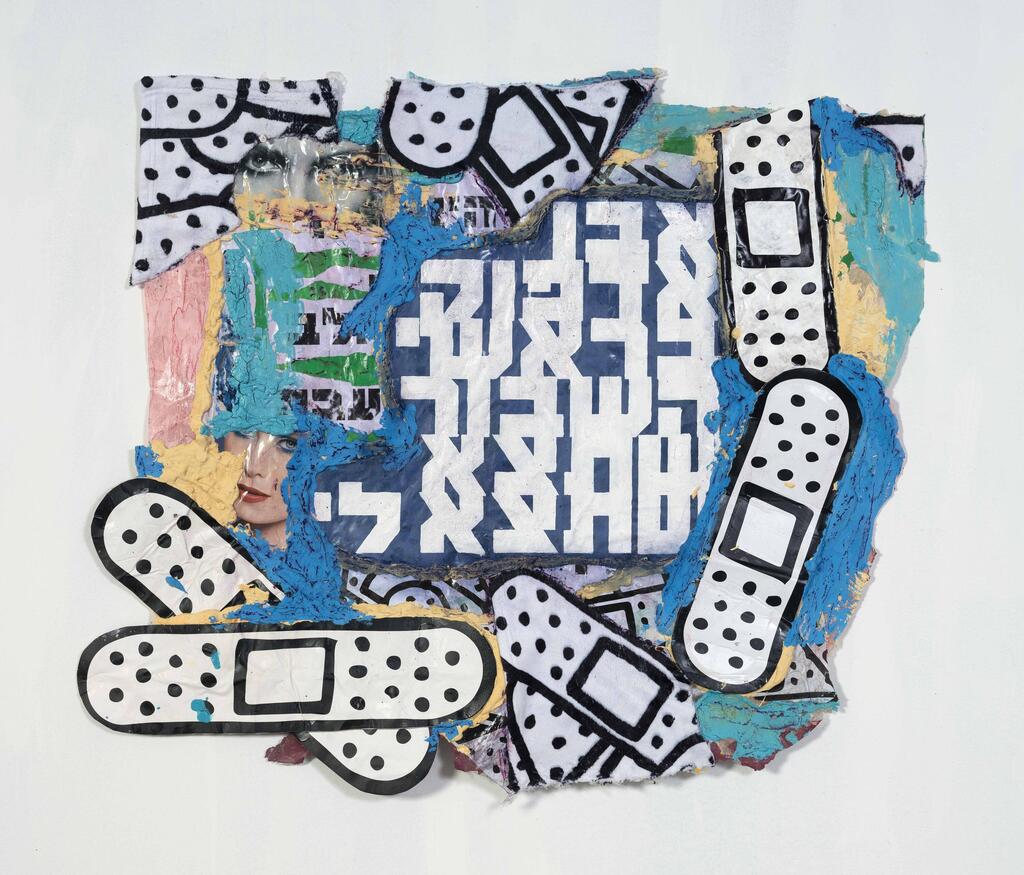

'Untitled' - a collaboration between street artists Dede Bandaid and Nitzan Mintz
(Photo: Zicky Eisenberg)
Dede: "So far it works perfectly. We share a studio in Israel and try to coordinate our artistic activities schedule both in Israel and abroad, so that we can always fly together and not spend time apart. The poster campaign moved the intensity of our relationship to its peak. We have become a mobile headquarters that works from home, from the studio, from the train, in cafés. We are together all the time."
Nitzan: "It's easy and natural for us to work together, we get along very well. I feel I'm lucky to have found such a connection."
Before initiating the most important Israeli advocacy campaign currently taking place abroad, Nitzan and Dede lived an artistic life in South Tel Aviv. On a usual evening at home, they would listen to a podcast together or enjoy watching a docu-series over a glass of wine.
"We are two good guys," Nitzan states, amused. "We don't do drugs; we eat a very healthy diet and we like to exercise. We like hiking in the country, having picnics, sitting on benches in the street looking at people, spending time in nature and drawing flowers."
What do you like most about each other?
Nitzan: "Dede is the most loyal man in the world. I know that as long as he lives, he will stay with me no matter what. I can trust him with my eyes closed. He won't go, he doesn't want to leave me for a minute. It's very important to me. He is smart and interesting."
Dede: "Nitzan is a perfect partner. She accepts my craziness, understands, and contains it. We complement each other in almost every way. She deals more with the text and I engage more with the drawing, and this complement can be seen in everything we do. Even when we have to go through the hardest things, we would do it with laughter and humor."
What will your future look like as a couple?
Nitzan: "We've been trying to get pregnant for a long time. It's a plan we've been working on for over a year and I hope we succeed. As long as the campaign requires us to work abroad, we'll stay here. Our dream and that of the entire country is that the hostages will return home, and then we can forget about all this. As far as I'm concerned, I'll delete the site as soon as the kidnapped return. This is our dream and it's the only thing we can think of right now. We were thrown into uncharted waters, and can't tell what tomorrow has in store."



